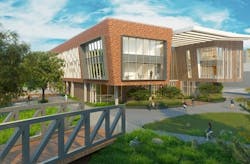Chico State University $98M project promises first Net-Zero building on Main Campus
New York-based Turner Construction Company has started construction on a new net-zero energy building for the College of Behavioral and Social Sciences at California State University (CSU), Chico.
The $98 million, 94,000-square-foot building will represent the first net-zero energy building on campus and the third in the CSU system, Turner said in a press release.
The project will include several sustainable features, such as solar panels, LED lighting, an efficient water system, an indoor garden, and a chilled beam cooling system, it adds.
Additionally, the building will house nine academic departments, including five laboratories; 22 classrooms; one large, tiered lecture hall; as well as conference space; faculty offices; breakout rooms for collaboration, and open and enclosed study spaces.
Designed by California-based architecture and research firm AC Martin, the building is expected to be open to students in the fall of 2024.
“As we work to attract and serve the next generation of changemakers, we’re proud to do so with one of the most state-of-the-art buildings in the entire CSU system,” said Gayle Hutchinson, President of California State University, Chico. “It sets a standard for the high-quality, high-value educational experience we offer at Chico State now and well into the future, while raising the bar for future efforts to support our commitment to sustainability.”
See our full Energy Efficiency coverage in EnergyTech
NORESCO selected to help California develop new Building Energy Code by 2025
Subscribe to our free, tri-weekly newsletter for more stories about the C&I Energy Transition
Turner Construction previously led work on Chico State's Student Services Center. The 122,000-suuare-foot facility gained LEED-NC Silver certification from the U.S. Green Building Council.
To achieve LEED certification, a project earns points by adhering to prerequisites and credits that address carbon, energy, water, waste, transportation, materials, health and indoor environmental quality. Projects go through a verification and review process by GBCI
